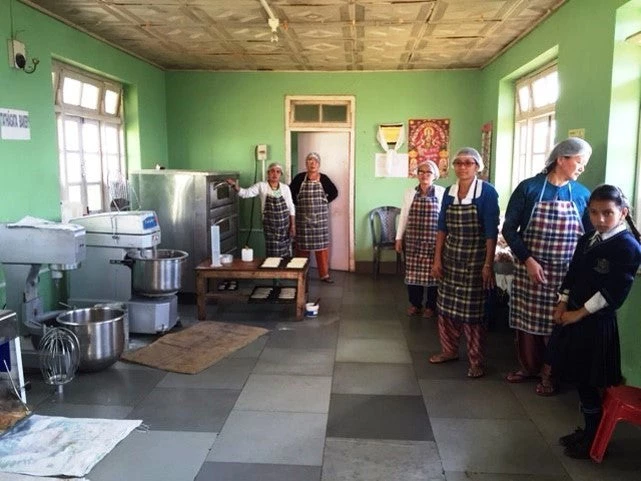An Eggless Bakery in Sikkim
Tucked away behind the monastery at the popular Buddha Park, on one of South Sikkim’s many serene hilltops, stands the eggless Tatagatha Bakery. The bakery is run by a Self-Help Group of local village women with funding through a microcredit program supported by the NERLP. A bakery is an unusual, innovative idea for microcredit, but the Buddha Park attracts many pilgrims, and the bakery is always in demand. Going eggless and dairy free has meant it can better cater to its core clientele of monks, pilgrims and visitors; it has also reduced the need to transport perishable supplies up the steep hilltop.
The project team mobilized a veteran baker from the rail head town of Siliguri to train the local women initially. The project ran into teething problems early on: a single SHG was rallied, but not all members were equally committed, which saw high dropouts after training. The team changed tack, and elicited individual interest regardless of membership. Twenty women have now been trained. Uptake by SHGs has undoubtedly been gradual, but it is early days yet – the bakery only opened in May 2016. These women see the bakery’s potential and are willing to bet on its success, accepting lower wages for now.

“We like this business,” says one baker. “Since we got the training, we’ve been able to supplement our income.” Each makes Rs.100 (~US$1.50) per day, plus overtime, a rate that will improve as the venture becomes more profitable.
The bakery business has other draws too. It’s a regular 9am – 5pm schedule, and the women find it easy to balance that with household responsibilities. But more than that, it is the sense of learning a worthwhile, transferable skill that has brought them the greatest satisfaction. As Anupa Mongar, a baker, confesses, “I always wondered how baked items were made. I had a great desire and curiosity to learn.”
“I enjoy feeding others,” admits Padmavati. “Previously we used to have to buy these items ourselves; now we’re making and selling them! I’m happy.”
The women themselves decide the wage rate; they ensure bakery profits are banked, and enough cash is retained for working capital needs. They take pride in keeping the bakery spick and span, essential when you churn out 48 loaves of bread a day, or 1,000 cream buns a week! When they are not selling to walk-in visitors, the bakery is busy with fixed orders from local schools.
The young and enthusiastic NERLP project team has ambitious plans for the venture – providing a diesel-run generator to supplement the irregular power supply, graduating the business to its own premises, opening 2-3 new outlets in big towns nearby, and sending the ladies to a college in Guwahati to upgrade their skills.
Homestays - Riding Sikkim’s Ecotourism Wave
Elsewhere in South Sikkim, Shanti Maya Thamang and the ‘Suraksha’ SHG to which she belongs, are riding the state’s eco-tourism wave. They have set up a ‘homestay’ hotel that reflects local tribal culture, offering three types of accommodation – a Nepali house, a Lepcha house, and a Bhutia house, each made by the group.
The SHG, a high performer, became the first in South Sikkim to establish a credit line with a bank. With a loan of Rs.450,000 they leased land at an enviable spot on the mountainside, registered as a cooperative, and now appear in the Dept. of Tourism’s homestay listings. They even hired an expert to market their homestay in distant Delhi and Kolkata!
Suraksha’s success has inspired others. Seeing the ecotourism potential in her locality, Goma Sharma wants to mobilize SHGs in her area to develop a nearby wasteland into a picnic spot. The project is now encouraging SHGs in other northeastern states of Mizoram and Nagaland to set up homestays.
Ginger cultivation, dairy farming, handloom weaving, rearing goats and pigs, and growing chilies are also being encouraged by the project in the region. In these ventures, the project helps aggregate individual output so that the group can secure better prices and terms.
What’s next on the cards is expanding coverage, scaling up, building bank linkages, and providing more young people with the skills they demand.


Join the Conversation